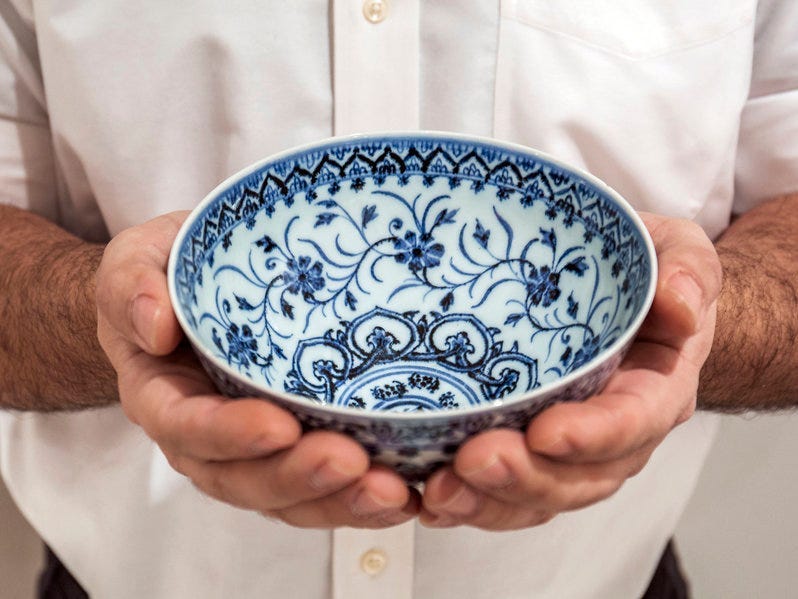
Sotheby's/AP
- A $35 ceramic bowl found at a yard sale is now being auctioned off by Sotheby's, and could fetch as much as $500,000.
- The bowl was bought by an unidentified bargain hunter in Connecticut, who sent pictures of it to appraisers at Sotheby's to get his find evaluated.
- The bowl will be auctioned in New York on March 17, as part of the lineup in Sotheby's Auction of Important Chinese Art.
- Visit Insider's homepage for more stories.
Going bargain hunting at yard sales has paid off for one Connecticut man: who purchased a small porcelain bowl for $35, only for it to turn out to be an exquisite and extremely rare 15th-century relic that could be worth half a million dollars.
The bowl, which measures 6 inches in diameter, is now set to be sold on March 17 in New York by auction house Sotheby's.
The Associated Press reported that the white bowl was a Ming Dynasty-era piece painted with blue flowers and other distinctive motifs and was one of only six such bowls known to exist in the world. None of the other bowls are in the US: two can be found in the National Palace Museum in Taipei, another two in London museums, and the last known piece in the National Museum of Iran.
Chinese news site Shanghai Daily reported that the piece had a distinctive design that resembled a lianzi (the Chinese term for lotus bud) or jixin (chicken heart) – an essential hallmark of Ming Dynasty pottery. The floral motifs on the bowl, depicting flowers like lotuses, peonies, and chrysanthemums, coupled with its glaze and unique workmanship, helped experts to identify it as a piece of value.
The AP reported that the bargain hunter was an antiques enthusiast who stumbled upon this rare find at a yard sale in the New Haven area. He later emailed pictures of the bowl to the Sotheby's auction house, asking for an evaluation.
Angela McAteer and Hang Yin, Sotheby's experts on Chinese ceramics and art, told the AP they knew immediately that they were "looking at something really very, very special." Upon viewing it in person, McAteer and Hang were able to confirm that the bowl dated back to the early 1400s, during the reign of Emperor Zhu Di, the third regent of the Ming dynasty.
McAteer told AP that it was "astounding" that such a treasure could appear "seemingly out of nowhere."
It remains unknown just how the bowl ended up at the yard sale. McAteer surmises that it could have been passed down through a family who did not know, nor suspect, that it could have been special.